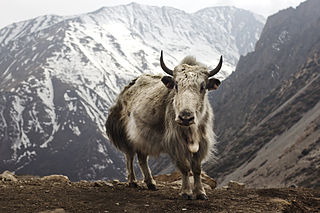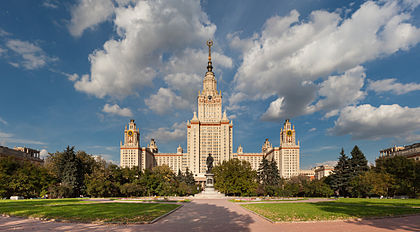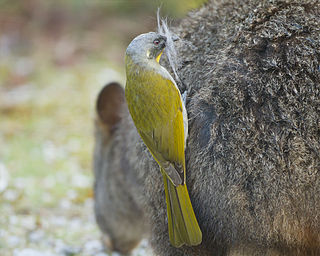|
Featured picture tools: |
These featured pictures, as scheduled below, appeared as the picture of the day (POTD) on the English Wikipedia's Main Page in February 2014. Individual sections for each day on this page can be linked to with the day number as the anchor name (e.g. [[Wikipedia:Picture of the day/February 2014#1]] for February 1).
You can add an automatically updating POTD template to your user page using {{Pic of the day}} (version with blurb) or {{POTD}} (version without blurb). For instructions on how to make custom POTD layouts, see Wikipedia:Picture of the day.Purge server cache
February 1

|
The crew of Space Shuttle mission STS-107 conducted international scientific investigations on the Space Shuttle Columbia. The shuttle disintegrated during atmospheric reentry on 1 February 2003 and the STS-107 crew perished. Tributes to the crew were made throughout the world. Rear (L-R): David Brown, Laurel Clark, Michael Anderson, Ilan Ramon; Photograph: NASA
Recently featured:
|
February 2

|
A portrait of Baldassare Castiglione (1478–1529), completed by Raphael c. 1514–15. Castiglione was an Italian courtier, diplomat, soldier and author during the Renaissance. Among his writings is The Book of the Courtier, which is framed around a series of conversations between courtiers at the court of Guidobaldo da Montefeltro and addresses the constitution of a perfect courtier and a perfect lady. Painting: Raphael
Recently featured:
|
February 3

|
|
Sainte-Enimie is a commune in the Lozère department in southern France. Named after a daughter of Chlothar II, who is said to have lived in the area after catching leprosy to avoid marriage, the commune has been the location of several monasteries. Tourism is now a major part of its economy, and many of the sites are religious in nature. Photograph: Tobi 87
Recently featured:
|
February 4

|
Velodona togata is the only species in the octopus genus Velodona; the genus and species names come from the large membranes that connect its arms. It was first described by Carl Chun in his book Die Cephalopoden (from which this illustration is taken) in 1915. A second subspecies was described by Guy Coburn Robson in 1924. Illustration: Ewald Rübsamen
Recently featured:
|
February 5

|
Male (top) and female Black-breasted Thrush (Turdus dissimilis), photographed at the Royal Agricultural Station in Ang Khang, Thailand. The common name of this species, which was first described in 1847 by Edward Blyth, is derived from the male's breast plumage. Photograph: JJ Harrison
Recently featured:
|
February 6

|
The Hubble Extreme Deep Field is an image of a small area of space in the constellation Fornax released by NASA on September 25, 2012. The successor to the Hubble Ultra-Deep Field, this image was compiled from 10 years of previous images with a total exposure time of two million seconds, or approximately 23 days. Image: NASA
Recently featured:
|
February 7

|
A caterpillar of Malacosoma neustria, also known as the Lackey moth. Caterpillars of this species form silken tents to regulate their temperature. Image: H. Krisp
Recently featured:
|
February 8

|
The Asfi Mosque, located near the Bara Imambara in Lucknow, India. Named for Asaf-ud-Daula, who ordered its construction, the mosque is regularly used for Friday prayers. Photo: Muhammad Mahdi Karim
Recently featured:
|
February 9

|
|
An aerial view of Frigiliana, a town of 3,000 in Málaga, Spain. Photo: Aqwis
Recently featured:
|
February 10

|
The Dom Luís Bridge is a 172-metre (564 ft) long metal arch bridge that spans the Douro River between the cities of Porto and Vila Nova de Gaia in Portugal. Designed by Téophile Seyrig, construction was completed in 1886. Photograph: Diego Delso
Recently featured:
|
February 11

|
Volvariella bombycina is a species of edible mushroom in the family Pluteaceae. Though uncommon, it is widespread, often growing singly or in clusters in old knotholes and wounds in elms and maples. Photograph: Hagen Graebner
Recently featured:
|
February 12

|
The Execution of Lady Jane Grey is an 1833 painting by Paul Delaroche which was bequeathed to the National Gallery in London in 1902. It portrays, erroneously in some regards, the moments preceding the death of Lady Jane Grey, who served as de facto Queen of England for nine days in 1553 before relinquishing the throne to Mary Tudor; Queen Mary later charged Lady Jane Grey (among others) with high treason. Painting: Paul Delaroche
Recently featured:
|
February 13

|
|
Laguna Colorada is a shallow salt lake located within the Eduardo Avaroa Andean Fauna National Reserve in Bolivia. The lake's reddish waters contrast with its white borax islands. Photograph: Christian Mehlführer
Recently featured:
|
February 14

|
Beata Beatrix, an 1870 oil on canvas painting depicting Beatrice Portinari (1266–90), subject of Dante Alighieri's La Vita Nuova, at the moment of her death; Dante claims to have met her only twice, on occasions separated by nine years, but was so affected by the meetings that he carried his love for her throughout his life. The artist, Dante Gabriel Rossetti, includes a red dove as the messenger of love in this work and modeled Beatrice after his deceased wife and frequent model, Elizabeth Siddal (1829–62). Painting: Dante Gabriel Rossetti
Recently featured:
|
February 15

|
The Crowned Lapwing (Vanellus coronatus) is a bird of the lapwing subfamily found in Africa, coast of the Red Sea to the southern and southwestern parts of the continent. Their diet consists mainly of insects, particularly termites. Photograph: Muhammad Mahdi Karim
Recently featured:
|
February 16

|
A 1901 illustration for "Break, Break, Break", an elegy by Lord Tennyson written in 1835 for his friend Arthur Hallam, who had died two years previously. Written during a period of relative isolation at Mablethorpe, Lincolnshire, the poem uses minimalistic terms and forgoes decorative aspects. In his biography of Tennyson, Michael Thorn describes it as "one of the great short lyrics". Illustration: William Edward Frank Britten; restoration: Adam Cuerden
Recently featured:
|
February 17

|
The Alexander Nevsky Cathedral is an Orthodox cathedral in Tallinn, Estonia. Built between 1894 and 1900 and dedicated to Alexander Nevsky, it was restored beginning in 1991. Photograph: Diego Delso
Recently featured:
|
February 18

|
Diaethria clymena is a species of butterfly found in Central and South America; this specimen was photographed in the Andes. The species' wingspan averages 30–40 millimetres (1.2–1.6 in) and the wings are easily recognizable for their distinct pattern, shaped like the number 88. Photo: Paolo Costa Baldi
Recently featured:
|
February 19

|
|
The Door to Hell is a natural gas field in Derweze, Turkmenistan, which has been burning since 1971 when it was ignited by Soviet scientists who expected it to burn out within days. They were trying to prevent the release of poisonous gases. The name "Door to Hell" was given to the field by locals. The hot spots range over an area with a width of 60 metres (200 ft) and to a depth of about 20 metres (66 ft). Photo: Tormod Sandtorv
Recently featured:
|
February 20
|
Lunar distance is a measurement of the distance from the Earth to the Moon. This diagram shows the distance, averaging 384,400 km (238,900 mi), to scale, as well as the Earth and the Moon (scroll to see the entire image). Model: Nickshanks
Recently featured:
|
February 21

|
The official logo of NROL-39, an American reconnaissance satellite launch for the National Reconnaissance Office and launched in 2013. This logo drew criticism following the ongoing surveillance disclosures; satirist Jon Stewart described it as the government "owning the fact that they are getting nefarious" with "a giant octopus sucking the face off North America". According to the NRO, the logo's "octopus [is] a versatile, adaptable, and highly intelligent creature" from which America's enemies cannot hide. Patch: National Reconnaissance Office
Recently featured:
|
February 22

|
The Long-toed Stint (Calidris subminuta) is a small and highly migratory wader bird. It breeds in northern Asia (little is known about its breeding habits) and winters in south and south east Asia and Australasia. This specimen was photographed in Pak Thale, Phetchaburi, Thailand. Photograph: JJ Harrison
Recently featured:
|
February 23

|
A yak at Letdar on the Annapurna Circuit in the Annapurna mountain range of central Nepal. Mostly domesticated, these long-haired bovids are found throughout the Himalayan region of south Central Asia, the Tibetan Plateau and as far north as Mongolia and Russia. Photograph: travelwayoflife
Recently featured:
|
February 24

|
Les raboteurs de parquet (The Floor Scrapers) is an 1875 oil on canvas painting by French impressionist Gustave Caillebotte. Measuring 102 by 146.5 centimetres (40 in × 57.7 in), it depicts three men scraping the floor of what is thought to be Caillebotte's own studio, apparently engaged in conversation. According to the Musée d'Orsay, where the painting is held, this is one of the first paintings to feature the urban working class, and indeed the subject matter proved scandalous at the time. Painting: Gustave Caillebotte
Recently featured:
|
February 25

|
Œnone is a poem written by Alfred, Lord Tennyson, in 1829. Inspired by the Greek mythological figure Oenone, first wife of Paris of Troy, the poem is a dramatic monologue following the lead-up to the Trojan War and the war itself. This illustration, by William Edward Frank Britten, is accompanied by the lines "O mother Ida, many-fountain'd Ida, / Dear mother Ida, harken ere I die". Illustration: William Edward Frank Britten; restoration: Adam Cuerden
Recently featured:
|
February 26

|
|
The current main building of the Moscow State University in Sparrow Hills, Moscow, Russia. Designed by Lev Rudnev and completed by 1953, the 240-metre (790 ft) tall structure was the tallest building in Europe until the completion of the Messeturm in 1990. Photograph: Dmitry A. Mottl
Recently featured:
|
February 27

|
A Yellow-throated Honeyeater (Lichenostomus flavicollis) stealing hair from a Tasmanian Pademelon for nesting material, Melaleuca, Southwest Conservation Area, Tasmania, Australia. The nest is constructed by the female from grass, bark-shreds, leaves and spiders' web and lined with treefern fibres, wool and fur. It is often within 1 metre (3 ft 3 in) of the ground in a low bush or tussock, but may occasionally be found at up to 10 metres (33 ft) in foliage. Photograph: JJ Harrison
Recently featured:
|
February 28

|
A 1937 photograph of Wes Brady, a former slave. Born c. 1850, Brady had been owned by a farmer in Marshall, Texas before emancipation. As a young boy he worked the fields, picking cotton. He recalled "The rows was a mile long and no matter how much grass was in them, if you leaves one sprig on your row they beats you nearly to death." This portrait is part of the Slave Narrative Collection, a massive compilation of slave narratives – containing 10,000 typed pages representing more than 2,000 interviews – which was undertaken by the US Federal Writers' Project of the Works Progress Administration from 1936 to 1938. Photograph: Federal Writers' Project; restoration: Chick Bowen
Recently featured:
|
Picture of the day archives and future dates
